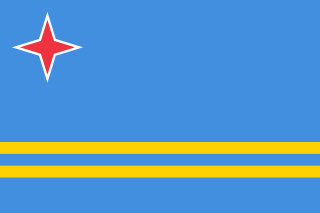
Aruba, officially the Country of Aruba, is a constituent country within the Kingdom of the Netherlands, in the southern Caribbean Sea 29 kilometres (18 mi) north of the Venezuelan peninsula of Paraguaná and 80 kilometres (50 mi) northwest of Curaçao. In 1986, it became a constituent country within the Kingdom of the Netherlands and acquired the formal name the Country of Aruba.

Amsterdam is the capital and most populated city of the Netherlands. It has a population of 921,402 within the city proper, 1,457,018 in the urban area and 2,480,394 in the metropolitan area. Located in the Dutch province of North Holland, Amsterdam is colloquially referred to as the "Venice of the North", for its large number of canals, now a UNESCO World Heritage Site.
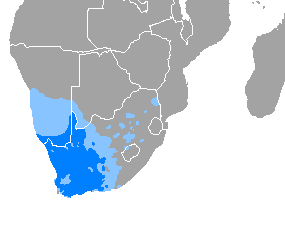
Afrikaans is a West Germanic language, spoken in South Africa, Namibia and Botswana, Zambia and Zimbabwe. It evolved from the Dutch vernacular of South Holland spoken by the predominantly Dutch settlers and enslaved population of the Dutch Cape Colony, where it gradually began to develop distinguishing characteristics in the 17th and 18th centuries.
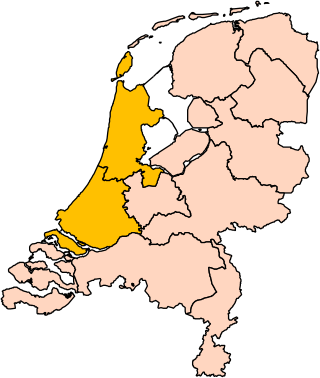
Holland is a geographical region and former province on the western coast of the Netherlands. From the 10th to the 16th century, Holland proper was a unified political region within the Holy Roman Empire as a county ruled by the counts of Holland. By the 17th century, the province of Holland had risen to become a maritime and economic power, dominating the other provinces of the newly independent Dutch Republic.

The Netherlands, informally Holland, is a country in Northwestern Europe, with overseas territories in the Caribbean. It is the largest of the four constituent countries of the Kingdom of the Netherlands. The Netherlands consists of twelve provinces; it borders Germany to the east and Belgium to the south, with a North Sea coastline to the north and west. It shares maritime borders with the United Kingdom, Germany, and Belgium. The official language is Dutch, with West Frisian as a secondary official language in the province of Friesland. Dutch, English, and Papiamento are official in the Caribbean territories.

Suriname, officially the Republic of Suriname, is a country in northern South America, sometimes considered part of the Caribbean and the West Indies. Suriname is a developing country with a medium level of human development; its economy is heavily dependent on its abundant natural resources, namely bauxite, gold, petroleum, and agricultural products. Suriname is a member of the Caribbean Community (CARICOM), the United Nations, and the Organisation of Islamic Cooperation.
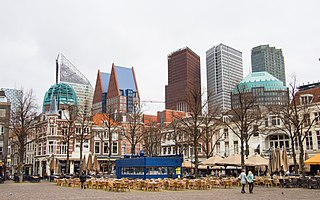
The Hague is the capital city of the South Holland province of the Netherlands. With a population of over half a million, it is the third-largest city in the Netherlands. Situated on the west coast facing the North Sea, The Hague is the country's administrative centre and its seat of government, and while the official capital of the Netherlands is Amsterdam, The Hague has been described as the country's de facto capital since the time of the Dutch Republic.
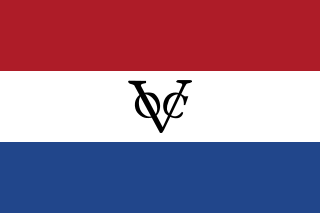
The United East India Company, commonly known as the Dutch East India Company, was a chartered trading company and one of the first joint-stock companies in the world. Established on 20 March 1602 by the States General of the Netherlands amalgamating existing companies, it was granted a 21-year monopoly to carry out trade activities in Asia. Shares in the company could be purchased by any citizen of the United Provinces and subsequently bought and sold in open-air secondary markets. The company possessed quasi-governmental powers, including the ability to wage war, imprison and execute convicts, negotiate treaties, strike its own coins, and establish colonies. Also, because it traded across multiple colonies and countries from both the East and the West, the VOC is sometimes considered to have been the world's first multinational corporation.

William III, also known as William of Orange, was the sovereign Prince of Orange from birth, Stadtholder of Holland, Zeeland, Utrecht, Guelders, and Overijssel in the Dutch Republic from the 1670s, and King of England, Ireland, and Scotland from 1689 until his death in 1702. He ruled Great Britain and Ireland with his wife, Queen Mary II, and their joint reign is known as that of William and Mary.

Utrecht is the fourth-largest city of the Netherlands, as well as the capital and the most populous city of the province of Utrecht. The municipality of Utrecht is located in the eastern part of the Randstad conurbation, in the very centre of mainland Netherlands, and includes Haarzuilens, Vleuten and De Meern. It has a population of 361,699 as of December 2021.
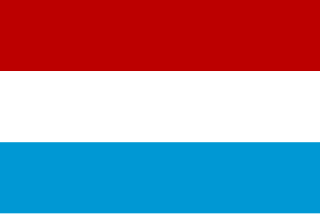
The United Provinces of the Netherlands, officially the Republic of the Seven United Netherlands and commonly referred to in historiography as the Dutch Republic, was a confederation that existed from 1579 until the Batavian Revolution in 1795. It was a predecessor state of the present-day Netherlands and the first independent Dutch nation state. The republic was established after seven Dutch provinces in the Spanish Netherlands revolted against Spanish rule, forming a mutual alliance against Spain in 1579 and declaring their independence in 1581. The seven provinces it comprised were Groningen, Frisia, Overijssel, Guelders, Utrecht, Holland, and Zeeland.

Curaçao, officially the Country of Curaçao, is a Lesser Antilles island in the southern Caribbean Sea, specifically the Dutch Caribbean region, about 65 km (40 mi) north of Venezuela. It is a constituent country of the Kingdom of the Netherlands.

The Belgium national football team has officially represented Belgium in men's international football since their maiden match in 1904. The squad is under the global jurisdiction of FIFA and is governed in Europe by UEFA—both of which were co-founded by the Belgian team's supervising body, the Royal Belgian Football Association. Periods of regular Belgian representation at the highest international level, from 1920 to 1938, from 1980 to 2002 and again from 2014 onwards, have alternated with mostly unsuccessful qualification rounds. Most of Belgium's home matches are played at the King Baudouin Stadium in Brussels.

The Dutch colonial empire comprised the overseas territories and trading posts controlled and administered by Dutch chartered companies—mainly the Dutch East India Company and the Dutch West India Company—and subsequently by the Dutch Republic (1581–1795), and by the modern Kingdom of the Netherlands after 1815.

The Dutch are an ethnic group native to the Netherlands. They share a common ancestry and culture and speak the Dutch language. Dutch people and their descendants are found in migrant communities worldwide, notably in Aruba, Suriname, Guyana, Curaçao, Argentina, Brazil, Canada, Australia, South Africa, New Zealand and the United States. The Low Countries were situated around the border of France and the Holy Roman Empire, forming a part of their respective peripheries and the various territories of which they consisted had become virtually autonomous by the 13th century. Under the Habsburgs, the Netherlands were organised into a single administrative unit, and in the 16th and 17th centuries the Northern Netherlands gained independence from Spain as the Dutch Republic. The high degree of urbanisation characteristic of Dutch society was attained at a relatively early date. During the Republic the first series of large-scale Dutch migrations outside of Europe took place.
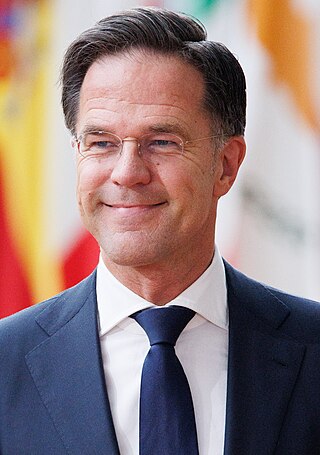
Mark Rutte is a Dutch politician who has served as the 14th secretary-general of NATO since October 2024. He previously served as the prime minister of the Netherlands from 2010 to 2024, and as the leader of the People's Party for Freedom and Democracy (VVD) from 2006 to 2023. Serving a total of almost 14 years, Rutte is the longest-serving prime minister in Dutch history.

The Kingdom of the Netherlands, commonly known simply as the Netherlands, is a sovereign state consisting of a collection of constituent territories united under the monarch of the Netherlands, who functions as head of state. The realm is not a federation; it is a unitary monarchy with its largest subdivision, the eponymous Netherlands, predominantly located in Northwestern Europe and with several smaller island territories located in the Caribbean.

Dutch is a West Germanic language of the Indo-European language family, spoken by about 25 million people as a first language and 5 million as a second language and is the third most spoken Germanic language. In Europe, Dutch is the native language of most of the population of the Netherlands and Flanders. Dutch was one of the official languages of South Africa until 1925, when it was replaced by Afrikaans, a separate but partially mutually intelligible daughter language of Dutch. Afrikaans, depending on the definition used, may be considered a sister language, spoken, to some degree, by at least 16 million people, mainly in South Africa and Namibia, and evolving from Cape Dutch dialects.

The Dutch East Indies, also known as the Netherlands East Indies, was a Dutch colony with territory mostly comprising the modern state of Indonesia, which declared independence on 17 August 1945. Following the Indonesian War of Independence, Indonesia and the Netherlands made peace in 1949. In the Anglo-Dutch Treaty of 1824, the Dutch ceded the governorate of Dutch Malacca to Britain, leading to its eventual incorporation into Malacca (state) of modern Malaysia.

Thomas Stanley Holland is an English actor. His accolades include a BAFTA Award and three Saturn Awards. He featured on the Forbes 30 Under 30 Europe list of 2019. Some publications have called him one of the most popular actors of his generation.

















